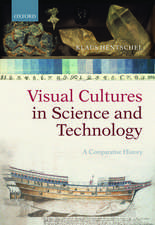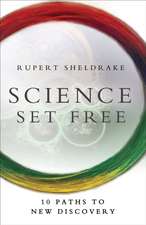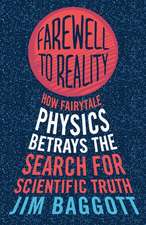Wondrous Truths: The Improbable Rise of Modern Science
Autor J.D. Trouten Limba Engleză Paperback – 26 apr 2018
| Toate formatele și edițiile | Preț | Express |
|---|---|---|
| Paperback (1) | 145.90 lei 31-37 zile | |
| Oxford University Press – 26 apr 2018 | 145.90 lei 31-37 zile | |
| Hardback (1) | 214.83 lei 31-37 zile | |
| Oxford University Press – 30 iun 2016 | 214.83 lei 31-37 zile |
Preț: 145.90 lei
Preț vechi: 189.57 lei
-23% Nou
Puncte Express: 219
Preț estimativ în valută:
27.93€ • 30.34$ • 23.47£
27.93€ • 30.34$ • 23.47£
Carte tipărită la comandă
Livrare economică 10-16 aprilie
Preluare comenzi: 021 569.72.76
Specificații
ISBN-13: 9780190878658
ISBN-10: 0190878657
Pagini: 260
Ilustrații: 3 illustrations
Dimensiuni: 208 x 137 x 18 mm
Greutate: 0.3 kg
Editura: Oxford University Press
Colecția OUP USA
Locul publicării:New York, United States
ISBN-10: 0190878657
Pagini: 260
Ilustrații: 3 illustrations
Dimensiuni: 208 x 137 x 18 mm
Greutate: 0.3 kg
Editura: Oxford University Press
Colecția OUP USA
Locul publicării:New York, United States
Recenzii
J.D. Trout proposes a fascinating, controversial, brilliant explanation for why modern science took off in the seventeenth century and never looked back. The Scientific Revolution was due, in his telling, not to the discovery of an amazing new methodological rule or form of social organization but rather to simple good luck: it was a matter of the right people probing the right ideas in the right way. Essential reading for historians and philosophers of science and highly recommended to anyone interested in the rise of modern science.
The principal idea of this short but entertaining popular book is that the standard narrative about how science arose across Europe, the one that tells us progress in scientific discovery during the seventeenth century was the result of the inevitable march of scientific method, is incorrect. Rather than being the result of sustained and diligent application of method, successful science is a consequence of hitting upon correct theories through a mixture of accident, luck, geography, and personal idiosyncrasy.... this is a very nice book advocating an original approach to how science got from there to here. I strongly recommend it to anyone even remotely interested in history and/or philosophy of science.
[I]n in the general motivation and aim of this book, I think Trout gets it entirely correct. Trout is at pains to articulate how precarious our epistemic position really is. By emphasizing the contingency of scientific theorizing, Trout points out how hard-won our theoretical knowledge is and consequently how precious it is. The epistemic location in which we now find ourselves was not inevitable, and we should take seriously the luck and serendipity that delivered us here. Understood this way, and understood as directed at those not already familiar with the idea that science is as much a product of contingency as of insight, the book offers an important and helpful viewpoint.
The principal idea of this short but entertaining popular book is that the standard narrative about how science arose across Europe, the one that tells us progress in scientific discovery during the seventeenth century was the result of the inevitable march of scientific method, is incorrect. Rather than being the result of sustained and diligent application of method, successful science is a consequence of hitting upon correct theories through a mixture of accident, luck, geography, and personal idiosyncrasy.... this is a very nice book advocating an original approach to how science got from there to here. I strongly recommend it to anyone even remotely interested in history and/or philosophy of science.
[I]n in the general motivation and aim of this book, I think Trout gets it entirely correct. Trout is at pains to articulate how precarious our epistemic position really is. By emphasizing the contingency of scientific theorizing, Trout points out how hard-won our theoretical knowledge is and consequently how precious it is. The epistemic location in which we now find ourselves was not inevitable, and we should take seriously the luck and serendipity that delivered us here. Understood this way, and understood as directed at those not already familiar with the idea that science is as much a product of contingency as of insight, the book offers an important and helpful viewpoint.
Notă biografică
J.D. Trout is Professor of Philosophy and Psychology at Loyola University in Chicago. His previous books include Measuring the Intentional World, Epistemology and the Psychology of Human Judgment (with Michael A Bishop), and The Empathy Gap. He has been interviewed in The New York Times, on Latino USA, and Martha Stewart Radio, and has written for the Chicago Tribune and Psychology Today.
















